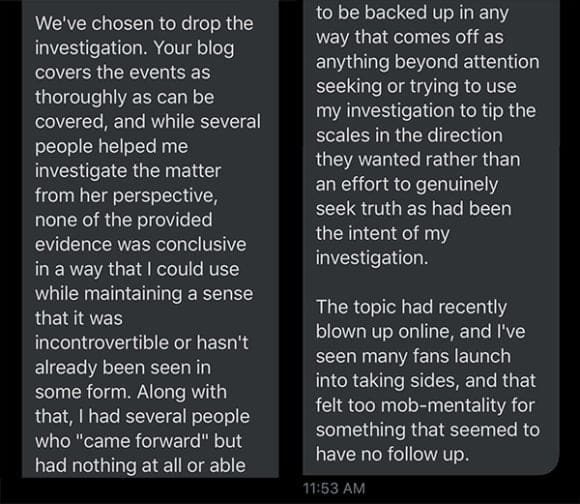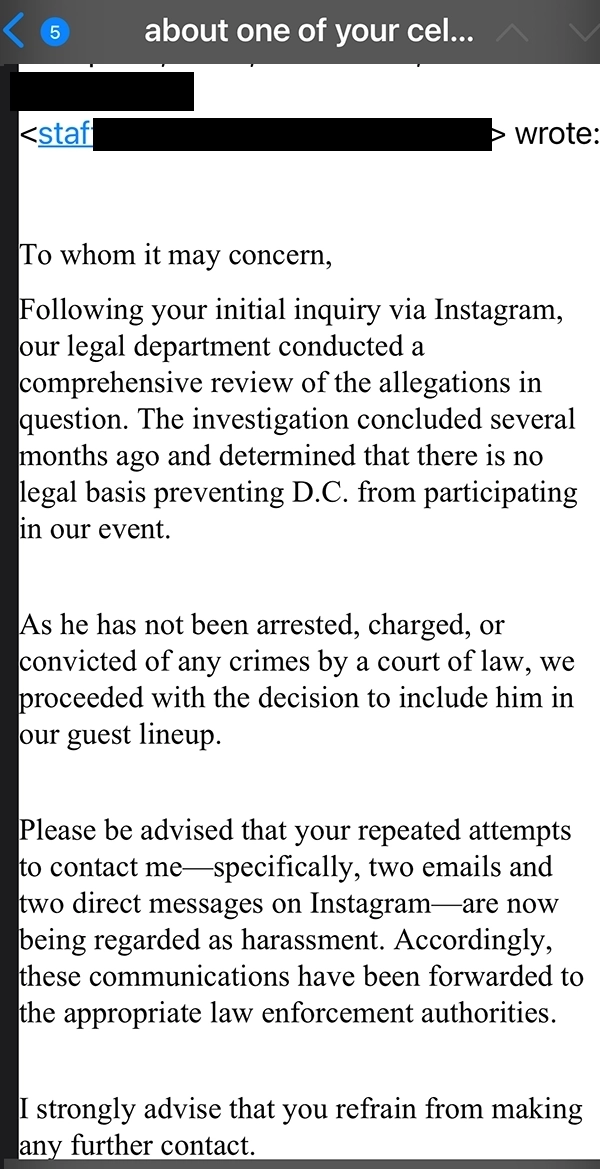Quick Jump Links:
↪ Heather Vandagriff Video Context
↪ Heather Vandagriff Profiles
↪ Peyton Waukau Profiles
↪ Online Reactions
↪ Email Exchange with Con Chair
Heather Vandagriff – Video Context
This video provides context from prior direct messages (shared with her acknowledgment that these were not private).

(Pause the video for each pagination.)
Quick Jump Links:
↪ Heather Vandagriff Video Context
↪ Heather Vandagriff Profiles
↪ Peyton Waukau Profiles
↪ Online Reactions
↪ Email Exchange with Con Chair
Return to Main Post Section:
↪ Background: Peyton Waukau
↪ Background: Heather Vandagriff
↪ Allegations Debunked
↪ Suing For Defamation
↪ F.A.Q.
Heather Vandagriff’s Archived Profiles
The following public accounts are listed for context. Do not engage with or harass the individual.
- wikipedia: DeadDoveMoli
- Twitter: @fatalcrxsh, @lovesocriminal, @xhercoldhands, @burnside_fan, @combatxxbaby, @a_9262x, @9262Icarus, @_9262x
- TikTok: @Heather.deaddove
- Reddit: @Molcocktease
- Instagram: @leatherette.eyes, @broken.birb, @ClubAlchemy505
Recent threads chronicling her harassment of others.

Quick Jump Links:
↪ Heather Vandagriff Video Context
↪ Heather Vandagriff Profiles
↪ Peyton Waukau Profiles
↪ Online Reactions
↪ Email Exchange with Con Chair
Return to Main Post Section:
↪ Background: Peyton Waukau
↪ Background: Heather Vandagriff
↪ Allegations Debunked
↪ Suing For Defamation
↪ F.A.Q.
Peyton Waukau’s Archived Profiles
These public profiles are listed for context. Do not engage with or harass the individual.
- Twitter: @bewarecreepyvas, @lilymaycosplay
- Instagram: @bewarecreepyvas


Peyton Waukau public Instagram post (archived).
Quick Jump Links:
↪ Heather Vandagriff Video Context
↪ Heather Vandagriff Profiles
↪ Peyton Waukau Profiles
↪ Online Reactions
↪ Email Exchange with Con Chair
Return to Main Post Section:
↪ Background: Peyton Waukau
↪ Background: Heather Vandagriff
↪ Allegations Debunked
↪ Suing For Defamation
↪ F.A.Q.
Online Reaction
Screenshots of online conversations following the public exposure of the defamation campaign.





Quick Jump Links:
↪ Heather Vandagriff Video Context
↪ Heather Vandagriff Profiles
↪ Peyton Waukau Profiles
↪ Online Reactions
↪ Email Exchange with Con Chair
Return to Main Post Section:
↪ Background: Peyton Waukau
↪ Background: Heather Vandagriff
↪ Allegations Debunked
↪ Suing For Defamation
↪ F.A.Q.
Email Exchange with Convention Chair
Example correspondence between the individuals and a convention chair, shared for documentation. Contact details of third parties only available to conventions who request it.
Initial email:

Con Chair reply:





Quick Jump Links:
↪ Heather Vandagriff Video Context
↪ Heather Vandagriff Profiles
↪ Peyton Waukau Profiles
↪ Online Reactions
↪ Email Exchange with Con Chair
Return to Main Post Section:
↪ Background: Peyton Waukau
↪ Background: Heather Vandagriff
↪ Allegations Debunked
↪ Suing For Defamation
↪ F.A.Q.







